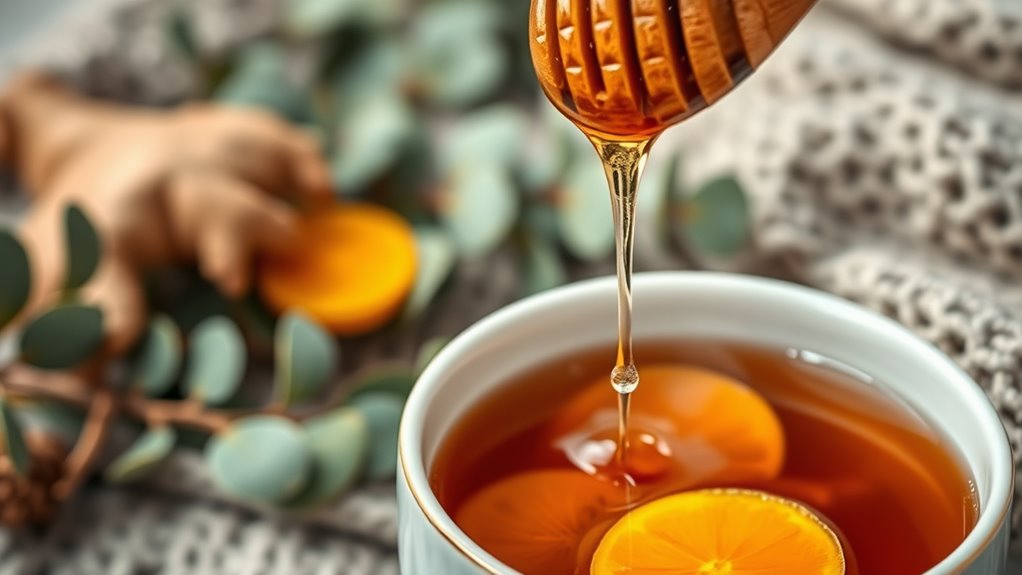Natural Allergy Remedies That Actually Work
If you’re tired of sneezing and congestion, natural allergy remedies might be your answer. Many effective options exist that can help alleviate symptoms without the drowsiness often caused by traditional medications. From herbal teas to essential oils, these remedies can support your body’s ability to cope with allergens. But not all remedies work the same for everyone. Discover which ones could provide the relief you need and how to incorporate them into your daily routine.
Key Takeaways
- Butterbur and nettle tea can effectively reduce allergy symptoms without causing drowsiness.
- Incorporate anti-inflammatory and vitamin C-rich foods to strengthen your immune system against allergens.
- Eucalyptus and peppermint essential oils can clear nasal passages and promote easier breathing.
- Homeopathic remedies like Allium cepa can alleviate sneezing and nasal congestion.
- Maintain a clean home environment and practice lifestyle changes to minimize allergen exposure.
Herbal Remedies for Allergies
When it comes to managing allergies, herbal remedies can offer a natural alternative for relief.
Many people find that herbs like butterbur and nettle effectively reduce symptoms.
Butterbur, in particular, has shown promise in studies, acting similarly to antihistamines without the drowsiness.
Nettle, often consumed as tea, can help alleviate nasal congestion and sneezing.
Another popular option is peppermint, which contains menthol that soothes irritated airways.
Incorporating these allergy remedies into your routine may provide a more holistic approach to allergy management. Local honey can also support your immune system and lessen allergic reactions.
Always consult with a healthcare professional before trying new herbal treatments to guarantee safety and effectiveness.
Dietary Changes to Combat Allergies
Making specific dietary changes can greatly help combat allergies and improve overall well-being.
Start by incorporating anti-inflammatory foods like fatty fish, nuts, and leafy greens, which may reduce allergic reactions.
Cutting out common allergens, such as dairy and gluten, can also be beneficial.
Be sure to increase your intake of vitamin C-rich foods—think citrus fruits and bell peppers—as they can boost your immune system.
Finally, stay hydrated and consider adding probiotics through yogurt or fermented foods to support gut health. Including quercetin-rich foods in your diet can enhance your body’s natural defenses against allergens.
These changes can empower your body and potentially lessen the impact of allergies in your daily life.
Essential Oils and Their Benefits
In addition to dietary changes, essential oils can offer significant relief from allergy symptoms. Oils like eucalyptus and peppermint can help clear nasal passages and promote easier breathing. Lavender oil, known for its calming properties, may reduce histamine responses, alleviating symptoms like sneezing and itchiness.
You can diffuse these oils in your home or apply them topically, diluted in a carrier oil, to experience their benefits. Research shows that inhaling essential oils can also reduce inflammation, providing further relief. Regular use of anti-inflammatory oils can enhance your overall well-being and support immune function.
Always perform a patch test before applying new oils directly to your skin to avoid any adverse reactions.
Homeopathic Treatments for Allergic Reactions
Have you ever considered how homeopathic treatments could provide relief from allergic reactions?
These remedies focus on stimulating your body’s natural healing processes.
One popular option is Apis mellifica, derived from honeybee venom, which can reduce swelling and itching from insect bites or stings.
Another effective remedy is Allium cepa, made from onions, which may help alleviate sneezing and nasal congestion.
Additionally, Natrum muriaticum, a salt-based remedy, is often recommended for hay fever symptoms.
Always consult a qualified homeopath to find the right treatment for your specific allergies, ensuring a personalized and safe approach to relief. Staying hydrated and eating a healthy diet can also support your immune system during allergy season.
Lifestyle Adjustments to Reduce Allergens
While homeopathic treatments can offer some relief for allergic reactions, making lifestyle adjustments can greatly reduce your exposure to allergens.
Start by keeping windows closed during high pollen seasons and using air purifiers to filter indoor air. Regularly clean your home to eliminate dust mites, mold, and pet dander. When outdoors, change clothes and shower after activities that expose you to allergens. Opt for hypoallergenic bedding and wash it frequently in hot water. Avoid smoking and secondhand smoke, as they can worsen allergy symptoms. Additionally, maintaining proper ventilation by opening windows when possible can help improve indoor air quality.
Natural Supplements for Allergy Relief
Many people find natural supplements a valuable addition to their allergy management toolkit. These can help reduce symptoms and improve your overall well-being. Some popular options include quercetin, an antioxidant that stabilizes mast cells, and butterbur, which may alleviate nasal congestion. Incorporating omega-3 fatty acids into your diet can also be beneficial, as they are known to reduce inflammation.
| Supplement | Benefits | Considerations |
|---|---|---|
| Quercetin | Antioxidant, reduces histamines | May cause digestive upset |
| Butterbur | Eases nasal congestion | Use caution; potential liver effects |
| Omega-3 Fatty Acids | Reduces inflammation | Fish allergies may be a concern |
Consult your healthcare provider to find the right supplement for your needs.
Breathing Techniques to Alleviate Symptoms
Breathing techniques like diaphragmatic breathing and the alternate nostril technique can greatly ease allergy symptoms.
By focusing on your breath, you can activate your body’s relaxation response, which helps reduce inflammation and congestion. Incorporating practices such as nasal irrigation can further enhance your respiratory health, providing additional relief during allergy season.
These simple practices not only promote better airflow but also enhance your overall well-being during allergy season.
Diaphragmatic Breathing Benefits
When you practice diaphragmatic breathing, you tap into a powerful technique that can greatly alleviate allergy symptoms. This method encourages deeper breaths, increasing oxygen flow and reducing stress, which can exacerbate your allergies.
Here’s a quick overview of diaphragmatic breathing benefits:
| Benefit | Description |
|---|---|
| Reduces Stress | Lowers cortisol levels, calming your body. |
| Improves Oxygenation | Enhances lung capacity and efficiency. |
| Promotes Relaxation | Activates the parasympathetic nervous system. |
| Increases Energy Levels | Boosts stamina by improving oxygen delivery. |
| Supports Overall Wellness | Contributes to better immune function. |
Incorporate this breathing technique into your daily routine for significant relief.
Alternate Nostril Technique
After exploring the benefits of diaphragmatic breathing, consider trying the Alternate Nostril Technique, which can further enhance your respiratory control and alleviate allergy symptoms.
This simple practice involves gently closing one nostril while inhaling through the other, then switching sides.
Research shows it can balance your nervous system, reduce stress, and improve airflow, making it easier to breathe.
To perform it, sit comfortably, close your right nostril with your thumb, inhale deeply through your left, then switch and exhale through your right. Repeat for several cycles.
Incorporating this technique into your routine can provide significant relief during allergy season.




